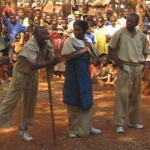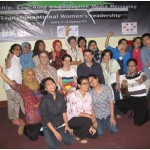For A More Peaceful World
Today is the 30th annual International Day of Peace, and we’re looking back on achievements our programs have made in building peace.
In the Democratic Republic of Congo (DRC)a major break-through was the non-aggression pact facilitated by Search between the Munzaya and Enyele ethnic groups in Equateur province. The pact was signed on March 31st 2011. Before this event SFCG had established an office in Dongo, to work more closely on confidence-building between the disputing communities.
From there SFCG had conducted participatory theatre activities designed to present alternative ways of dealing with conflict. SFCG also helped to organize joint activities, conflict management trainings, and the creation of a joint management committee of the disputed fishing ponds which were the catalyst for the initial conflict. International media literally followed in our footsteps and undertook the five-hour walk through the forest to the conflict-torn communities, to see the seeds of peace beginning to blossom. Their coverage can be seen at TV5 Monde from France.
In Liberia SFCG designed a training program to increase the overall capacity of the radio station Kintoma. This included technical assistance as well as a special focus on the inclusion of women working for the radio. The goal was to strengthen women’s voices and to reach out to the female community of Lofa County. Programs and initiatives of women’s organizations in Lofa have been publicized on the radio, motivating them to do even more.
At the same time, a forum for women is available through the “Women’s Voice” program to express their views about governance, poverty, violence against women, and development. The station even hosted President Johnson Sirleaf when she visited Lofa, holding a live radio talk show in which she engaged with callers and answered questions.
In the Middle East and North Africa CGNews has launched the user-driven website 1001 Stories of Common Ground to give activists a platform to share images, video and stories of positive change in the region with a bigger community. We launched the “Positive Change in Action” competition numerous pieces were submitted.
One of the winners was a story of a Lebanese woman who had taught illiterate women in refugee camps about microfinance. Not only was her story published in a variety of news sources, including the Lebanon Daily Star, but a reader from Sub-Saharan Africa was so inspired by her work that he wanted to get in touch with her and work in a refugee camp in Lebanon himself.
SFCG’s Jerusalem office joined with three other NGOs—the Oslo Centre for Peace, One World in Dialogue and Religions for Peace—to develop a universal Code on Holy Sites. For the first time ever, this now-completed initiative has mapped out a detailed code of conduct in respect to sacred places worldwide. World religious leaders and institutions are already endorsing the code. The intention is for it to be recognized by a United Nations body that would set up a monitoring mechanism to assess the progress (or lack thereof) of countries committed to abide by it.
In January a Nepalese version of SFCG’s successful soap opera on soccer “The Team” was launched under the name “Hamro Team.”  Nepal is a country in transition where citizens have widely divergent opinions on political and social issues. Hamro Team is about making helping people to believe in their dreams, pursue them, and work together collaboratively as a team to build the nation. As the director of the show states, the serial is “an effort to make you feel that if Nepal unites as a country, no one can beat us and stop us from moving forward. Another unique aspect of The Team for a Nepali audience is the idea of a woman coaching a men’s sports team. Reecha Sharma, who plays Seema, believes that there is no similar female character currently on Nepali television and that it will take time for another to appear.
Nepal is a country in transition where citizens have widely divergent opinions on political and social issues. Hamro Team is about making helping people to believe in their dreams, pursue them, and work together collaboratively as a team to build the nation. As the director of the show states, the serial is “an effort to make you feel that if Nepal unites as a country, no one can beat us and stop us from moving forward. Another unique aspect of The Team for a Nepali audience is the idea of a woman coaching a men’s sports team. Reecha Sharma, who plays Seema, believes that there is no similar female character currently on Nepali television and that it will take time for another to appear.
How are people celebrating around the world?
Events vary in scale, form, and duration. They may be as simple a gesture as lighting a candle for peace at midday, sitting down in silent meditation and prayer, staging a concert for peace, organizing a forum.
But one focal point around the entire planet will be the minute of silence at noon, on September 21, 2011, as requested by UN Secretary General Ban Ki-moon.
A list of Events in all countries around the world can be found here













